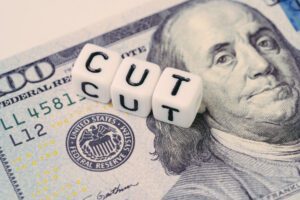On July 31, the Federal Reserve lowered its interest rate for the first time in over a decade. Now set at between 2 percent and 2.25 percent, the rate was cut due to various factors such as “trade policies and low inflation,” according to Federal Reserve Chairman Jerome Powell. The response from the auto industry hasn’t been as pronounced as it is when other changes are announced (e.g. tariffs), making it seem like an underwhelming change. However, the rate modification is sure to have at least some sort of impact on dealerships and consumers. Keith Crane of Automotive News reported that this might be good news for the automotive industry because “dealers and other borrowers now have a chance to get their money a little bit cheaper.” Dealerships who are slightly strapped for cash can borrow money without getting hit with interest as hard in the past, leading many to take advantage of the new rate. The chairman of AutoNation, Mike Jackson, had previously predicted that federal interest rates would get reduced and stated, “it is going to be very beneficial to customers.” According to Jackson, if the interest rates are lower, consumers might be able to negotiate with dealers more and get a better deal, perhaps even being able to buy an even more expensive car. A July 31 CNBC article reported that the quarter-point difference on a loan is “not going to translate into any notable difference for would-be car buyers,” but the rate cut “lowers financing costs for car manufacturers and dealers as well” and allows more aggressive negotiations that can be made by consumers. Put simply, dealerships that have more money have more room to negotiate with customers.
 Overall, KAR Auction’s chief economist Tom Kontos stated that “these rate cuts will help the economy.”
Jonathan Smoke of Cox Automotive stated he is unsure how the rate cut will impact the economy in the long run; however, he expects a “moderate impact on auto finance, but less than other forms of finance.” He also noted that dealerships would see an “immediate reduction in the interest expenses” that they pay for infrastructure and inventory, among other things.
The reduced interest costs may also be beneficial towards employment figures because dealerships can retain their employees and some may also have room to hire new ones.
Yun Li of CNBC also reported that current numbers and trends suggest the Fed may cut the rates again next month, which may or may not be surprising after the Fed had not ruled out further cuts last month. Some financial experts are nervous, stating that if the U.S. economy does start struggling at some point, the Fed won’t be able to lower the rate as much. Others are wary and skeptical about the economy, as even though it appears strong, the cuts may signal there are a lot of uncertainties in the market.
Seeing as the Feds haven’t lowered the rate since the Great Recession of the 2000’s, there are clear indications this could have an impact on suppliers and consumers in all industries. The volatile “trade wars” and overall economic growth (or decline) will likely impact the outcome of the Feds’ recent move, but for now dealers seem to be hopeful the interest cut will be beneficial for business.
Overall, KAR Auction’s chief economist Tom Kontos stated that “these rate cuts will help the economy.”
Jonathan Smoke of Cox Automotive stated he is unsure how the rate cut will impact the economy in the long run; however, he expects a “moderate impact on auto finance, but less than other forms of finance.” He also noted that dealerships would see an “immediate reduction in the interest expenses” that they pay for infrastructure and inventory, among other things.
The reduced interest costs may also be beneficial towards employment figures because dealerships can retain their employees and some may also have room to hire new ones.
Yun Li of CNBC also reported that current numbers and trends suggest the Fed may cut the rates again next month, which may or may not be surprising after the Fed had not ruled out further cuts last month. Some financial experts are nervous, stating that if the U.S. economy does start struggling at some point, the Fed won’t be able to lower the rate as much. Others are wary and skeptical about the economy, as even though it appears strong, the cuts may signal there are a lot of uncertainties in the market.
Seeing as the Feds haven’t lowered the rate since the Great Recession of the 2000’s, there are clear indications this could have an impact on suppliers and consumers in all industries. The volatile “trade wars” and overall economic growth (or decline) will likely impact the outcome of the Feds’ recent move, but for now dealers seem to be hopeful the interest cut will be beneficial for business.








